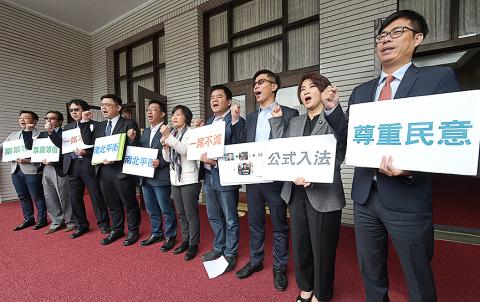The Central Election Committee’s planned adjustments to the allocation of legislative seats for the 2020 election would exacerbate the north-south divide and aggravate legislative malapportionment, Democratic Progressive Party (DPP) lawmakers told a news conference yesterday, saying constitutional reform is the sole solution.
The committee on Feb. 1 announced plans to assign one additional seat for both Tainan and Hsinchu County, while taking away one seat each from Kaohsiung and Pingtung County.
The north-south divide refers to the unequal pace of development between more urbanized northern Taiwan and the rural south, while the issue of malapportionment refers to the suspicion that a majority of electoral constituencies have been assigned to certain areas to protect some communities of interest, she said.

Photo: Chang Chia-ming, Taipei Times
The change would lead to fewer lawmakers representing Kaohsiung voters — eight lawmakers would represent 340,000 voters, instead of the current nine representing 300,000 voters — despite the city’s population not declining, she said.
A draft amendment to Article 4 of the Constitution has been cosigned by 35 lawmakers, DPP Legislator Liu Shih-fang (劉世芳) said, in which each of the 73 regional legislative seats would represent 300,000 voters, with an additional seat assigned for every 150,000 voters after that by taking one seat out of the legislator-at-large list, Liu said.
The amendment would maintain the current maximum of 113 legislative seats and would minimize the controversies caused by the two issues, she said.
DPP Legislator Chung Chia-pin (鍾佳濱) said total legislative seats is sure to decrease over the coming decade and constituencies should be drawn in proportion to area in addition to population.
Northern Taiwan has an area of 10,281km2 and a population of 9.71 million, while the south covers 25,000km2 and has 8.35 million people, and yet northern Taiwan is represented by 36 legislative seats, while southern Taiwan has 34, Chung added.
Legislative representation for Hsinchu County would be almost halved — from 550,000 per seat to 270,000 per seat — if the committee’s proposal is passed, DPP Legislator Lai Jui-lung (賴瑞隆) said, adding that compared with Lienchiang County, representing 120,000 voters per seat, it is evident that the system is problematic.
Lai called for the establishment of a more rational legislative seat apportionment via constitutional reform.
The committee’s baseless revision of electoral seats in Kaohsiung and Pingtung County would harm the concept of apportionment, DPP Legislator Chao Tien-lin (趙天麟) said, adding that he supports constitutional reform.
Apportionment is a core value of democracy and any issue guaranteed by the Constitution that is to be changed should only be changed through the Constitution, DPP Legislator Chen Chi-mai (陳其邁) said.
How legislative seats are defined, and by what equations, should be made clear and written into law, Chen said, adding that only then could anyone be satisfied that the rules are clear.
Results of the proposed changes, if tendered to the legislature’s Internal Administration Committee by May 31, would be announced by Jan. 31 next year and, if passed, used in the 2020 legislative election.

Taiwanese can file complaints with the Tourism Administration to report travel agencies if their activities caused termination of a person’s citizenship, Mainland Affairs Council Minister Chiu Chui-cheng (邱垂正) said yesterday, after a podcaster highlighted a case in which a person’s citizenship was canceled for receiving a single-use Chinese passport to enter Russia. The council is aware of incidents in which people who signed up through Chinese travel agencies for tours of Russia were told they could obtain Russian visas and fast-track border clearance, Chiu told reporters on the sidelines of an event in Taipei. However, the travel agencies actually applied

New measures aimed at making Taiwan more attractive to foreign professionals came into effect this month, the National Development Council said yesterday. Among the changes, international students at Taiwanese universities would be able to work in Taiwan without a work permit in the two years after they graduate, explainer materials provided by the council said. In addition, foreign nationals who graduated from one of the world’s top 200 universities within the past five years can also apply for a two-year open work permit. Previously, those graduates would have needed to apply for a work permit using point-based criteria or have a Taiwanese company

The Shilin District Prosecutors’ Office yesterday indicted two Taiwanese and issued a wanted notice for Pete Liu (劉作虎), founder of Shenzhen-based smartphone manufacturer OnePlus Technology Co (萬普拉斯科技), for allegedly contravening the Act Governing Relations Between the People of the Taiwan Area and the Mainland Area (臺灣地區與大陸地區人民關係條例) by poaching 70 engineers in Taiwan. Liu allegedly traveled to Taiwan at the end of 2014 and met with a Taiwanese man surnamed Lin (林) to discuss establishing a mobile software research and development (R&D) team in Taiwan, prosecutors said. Without approval from the government, Lin, following Liu’s instructions, recruited more than 70 software

Taiwanese singer Jay Chou (周杰倫) plans to take to the courts of the Australian Open for the first time as a competitor in the high-stakes 1 Point Slam. The Australian Open yesterday afternoon announced the news on its official Instagram account, welcoming Chou — who celebrates his 47th birthday on Sunday — to the star-studded lineup of the tournament’s signature warm-up event. “From being the King of Mandarin Pop filling stadiums with his music to being Kato from The Green Hornet and now shifting focus to being a dedicated tennis player — welcome @jaychou to the 1 Point Slam and #AusOpen,” the